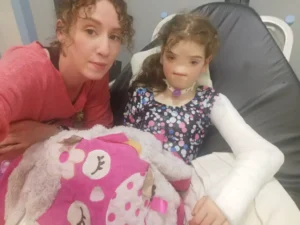The human body’s ability to adapt to unique challenges is nothing short of extraordinary, as evidenced by the inspiring story of Tessa Evans. Born on Valentine’s Day in 2013 without a nose, Tessa was diagnosed with Bosma arhinia microphthalmia syndrome, a rare genetic condition that affects the development of the nose, eyes, and puberty, as well as brain structure. This condition, with only about 100 recorded cases globally, was first documented in Vietnam in 1981, though historical references suggest it may date back further. Tessa’s journey, marked by groundbreaking medical advancements and the unwavering support of her family, has touched countless hearts and made significant contributions to the field of medicine.

Despite the initial shock of her diagnosis, Tessa’s parents, Grainne and Nathan Evans from Maghera, Northern Ireland, embraced her uniqueness and sought innovative treatments to improve her quality of life. At just two weeks old, Tessa underwent her first surgery to receive a tracheostomy tube, enabling her to breathe and eat more easily. By age two, she became the youngest patient to receive a cosmetic nasal implant, thanks to advancements like 3D printing and medical tattoo artistry. Her story not only inspires hope but also paves the way for others with similar conditions to explore life-changing medical interventions. Through her family’s dedication and her own courage, Tessa continues to challenge perceptions and foster progress in medical science, showing that resilience and love can overcome even the most extraordinary challenges.